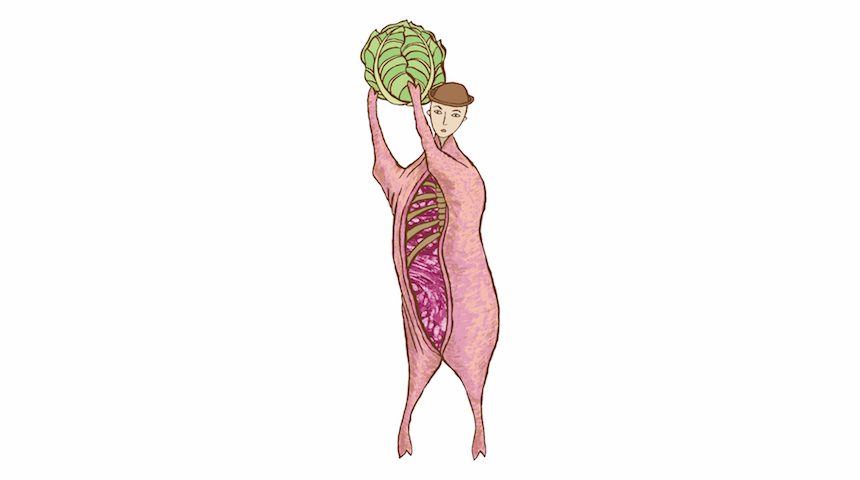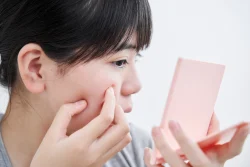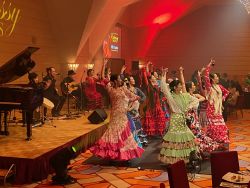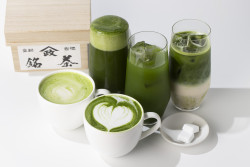
April 12, 2018
I Started Something I Couldn’t Finish
The tribulations of being a vegan in Japan
Some time ago, during my Cup Noodles craze as a student in California, I caught myself pinching the growing rolls of fat on my stomach one too many times. My insecurities led to a desperate and exhaustive internet search for diet tips—a black hole I think we’ve all been sucked into at one time or another. One day it’s “exercises for a beach body” video; the next it’s a date with Domino’s Pizza. Often I would pair my greasy slice of dough with a Netflix film. This was my routine throughout high school, until I hit rock bottom: Netflix recommended the thing I wanted to ignore most while eating a pizza, vegan documentaries.
My first encounter with veganism began with a documentary called Cowspiracy. Co-directors and producers Kip Andersen and Keegan Kuhn released the film in 2014, a contentious attack on the culture of animal and animal by-product consumption. The host, Kip Andersen, had an infallible way of deconstructing the food industry as the deception machine it really is, according to the film. And they had a talent for making me, a carnivorous human being, look like the scum of the earth. If you’re up for an end-of-the-world scare brought on by the Big Brothers of the meat, fish and dairy industries, Cowspiracy does just that. Yet the filmmakers offer a chance for redemption for us meat-eaters: convert to veganism, and lower your carbon footprint.
In the early spring of 2015, I cut out fish, dairy, eggs and meat from my life entirely—better known as the vegan diet and lifestyle. I discovered a chippier side of me that I didn’t know existed, and cutting my weight down 5 kilograms was just the non-dairy icing on the vegan cake. But it wasn’t easy. Replenishing myself with all the dietary supplements needed on a vegan diet resulted in a dull routine of almonds, tofu and chickpeas.
The temptations were unbearable too. Food is a drug, and I’ve dreamed of injecting a cheeseburger into my veins since the day I became vegan. Yet these urges of mine, however strong, were fought off by a feeling of newfound vitality. I knew that a good carrot and hummus snack would put me back into fighting form, and my body would thank me later.
Then came the fall of 2015 when I moved to Japan to study full-time at university. The stress kicked in, money became tight, and gradually I could no longer resist Japanese pudding. Or the takoyaki. And how could I pass up sashimi in the land with the best sashimi?
Here, my vegan success story plummeted. With too many dietary restrictions enabling me to eat casually with friends and colleagues, I began to tease my subconscious. What harm would a little bit of fish, eggs and dairy really do to me? Ignoring the fact that I cared for the welfare of animals, I rationalized my decision due to the smorgasbord of yummy foods to be had in Japan. Soon, I downgraded to vegetarian, then pescetarian, and from there on my dietary restrictions began to lessen every day.
In little to no time, winter hit. The Christmas spirit was in full motion and KFCs all over Japan were racking up customers like mad. On Christmas Day, at my friend’s house, I indulged in my first bit of meat for six months. I rationalized this by thinking, “Well, I’m being culturally sensitive.”
Now, my personal vegan journey has a funny history. I could never figure out how, in 2015, I pulled off six months of a clean, vegan diet. After three years of living in Japan the answer to how I lapsed became glaringly obvious: I’m living in Japan!
Japan sells some of the most expensive produce in the world, with rare fruits and vegetables that sell for as much as ¥26,000 (such as the Yubari cantaloupe). A carton of eggs however? They go for as cheap as ¥250; a 1000-ml carton of milk can go for around ¥200.
And if the convenience of finding affordable fruits and vegetables wasn’t poor enough, try finding a vegan meal at your favorite restaurant in Japan. If the restaurant isn’t targeted toward a vegan audience, the chances are slim to zero. Most of the time you will be getting a head of lettuce with no pizzazz, or a waiter who will raise an eyebrow at what it means when you say, “I’m vegan.”
Don’t expect many Japanese people to know what veganism means. It’s a negligence related to their culture of food liberty, like the controversy over Japan’s whaling industry; if eating a pig is okay, then the same should apply for whales.
Like the person I was before watching vegan documentaries, I believe that we as a society are driven to ignore veganism. We don’t really understand its benefits to the world, but one thing we know for sure is that it endangers our right to eat Kobe beef and cheese plates, and that’s a no-go. Coming to Japan created the biggest obstacle to my hopes of becoming a long-term vegan, with the cultural inconveniences and costs ramped up for the small 1% of vegans. However, I will have to revisit Cowspiracy one day in hopes that I can return to my roots. After all, what’s more disheartening than a person’s cultural context changing one’s ambitions?







